‘Sovereign citizen’ torn to shreds by council
A council worker has been praised for sending a brutal letter rubbishing a “sovereign” citizen’s nonsensical attempt to escape paying rates.

A council worker has been praised for their ruthless take-down of a so-called “sovereign citizen” who tried to avoid paying rates using baseless pseudo-legal jargon.
It’s understood the NSW resident felt empowered to send a six-page letter to their local council challenging their unpaid rates after joining a Telegram group for “freedom folk”.
But their letter was met with an unflinching response from a civil servant, who systematically shot down every one of their “nonsensical” legal claims.
A copy of the council worker’s brutal response, and the Telegram discussion that led to the failed attempt to escape paying overdue bills, was shared on Twitter this week.
The Telegram chat begins with an unnamed “sovereign” asking if anyone in the group has tried to get out of paying credit card debt using the “bills of exchange act”.
“On the process now of doing – see how it goes,” replies one. “They are still sending letters but extending time – a bit at (a) time – really getting stressful.”
“Same here – lost the lot … and trying to not let fear sneak in of someone arresting me as the threat letters are coming in,” adds a third.
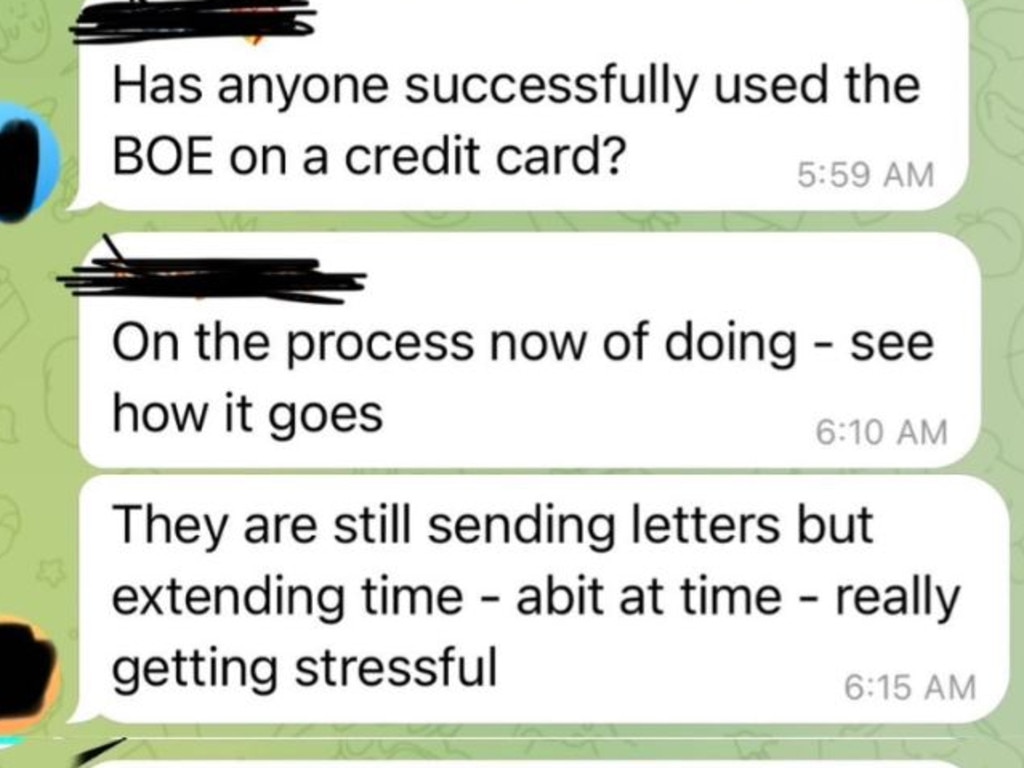
Council worker’s step-by-step destruction of sovereign citizen
The council worker begins by explaining that the sovereign’s repeated Biblical references hold no legal basis.
“I refer to your letter received on June 26, 2024. Your missive is somewhat confusing,” they write.
“On page 1, you refer to the “Maxims at Law” and then provide various Christian biblical references. Australia is a secular nation and bible references are not considered law.”
Next up is a history lesson about the differences between the Catholic Church and Church of England.
“I would suggest you research the Reformation and King Henry VIII of England to provide you with the background,” they write.
“Nobody has been held to account to BOTH the Church of England and the Catholic Church since the Pope refused to dissolve the marriage of Henry VIII and Catherine of Aragon so Henry could marry the already pregnant Anne Boleyn.
“Also, while an interesting part of history, I am unsure what either the Church of England or the Catholic Holy See have to do with (council fines) in 2024.”
What follows is a quick correction about the Commonwealth of Australia.
“You assert that the Commonwealth of Australia is a company. It is not. This is a common misperception by people who go down rabbit warrens of nonsense on the internet.”
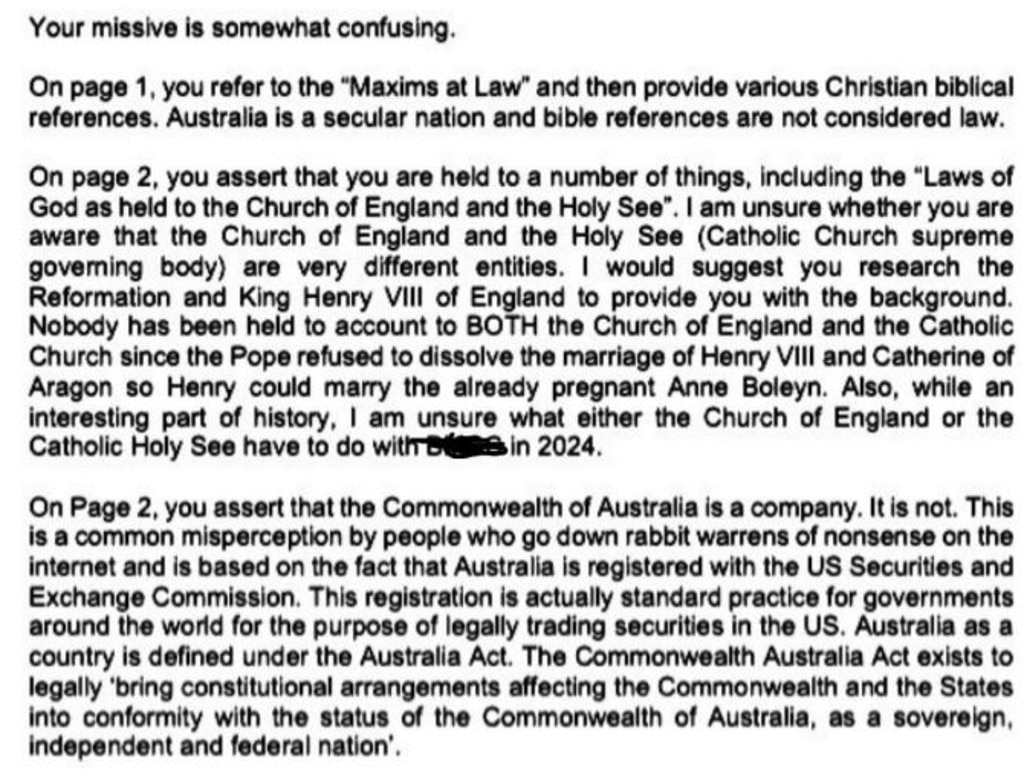
The council worker then mocks the sovereign citizen for copying paragraphs from an outdated template likely found online.
“Page 2, you also refer to Her Most Gracious Majesty the Queen”. I am sorry to be the one to advise, but Her Majesty died on 8 September 2022. King Charles Ill is the current monarch for Australia.
“I am afraid this is what happens when you copy things from the internet without reviewing them.”
Next in the government employee’s line of attack is the sovereign’s reference of an obscure case law about a dispute involving Queensland Rail and a major union.
“Page 2, you use a citation for HCA 11, 2015 and then incorrectly use case law to extrapolate to a point that it was never intended,” they write.
“I am completely unsure why you would use this to argue that you should not pay rates to your local council.”
The council worker then explains why the sovereign’s interpretation of Section 109 of the Australian constitution is deeply flawed.
“On page 4, you state that section 109 ‘nullifies every new law since 1900 in any State contrived Local Government Acts’.
“Section 109 of the Australian Constitution actually just refers to the inconsistency issues that may arise in a federation.”
“No state is permitted to have a state law that would contradict or be inconsistent with a federal law. The NSW Local Government Act is not inconsistent with any federal law.”
The sovereign’s attempt to define council rates as the “distribution of goods” is also shot down bluntly.
“Rates paid to Local Councils under the NSW Local Government Act have nothing whatsoever to do with a stage in the distribution of goods and therefore this is not relevant case law for your argument.
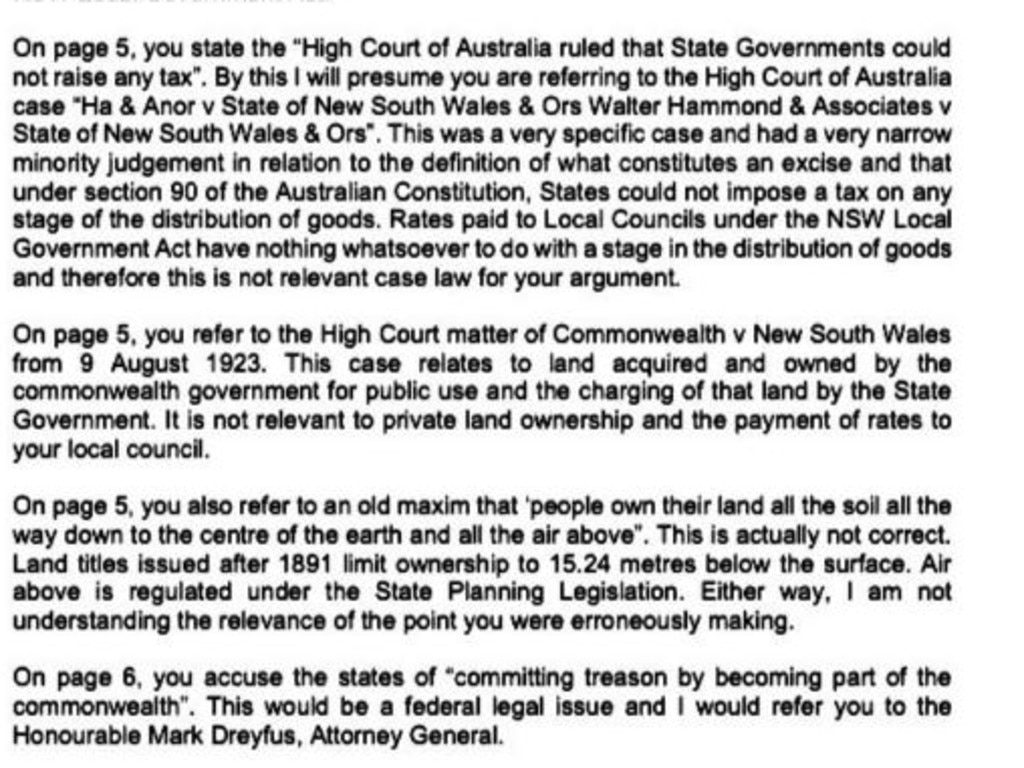
In perhaps the most widely-applauded segment of the letter, the council worker schools the sovereign about land ownership.
“On page 5, you also refer to an old maxim that ‘people own their land all the soil all the way down to the centre of the earth and all the air above’. This is actually not correct.”
“Land titles issued after 1891 limit ownership to 15.24 metres below the surface. Air above is regulated under the State Planning Legislation. Either way, I am not understanding the relevance of the point you were erroneously making.”
The letter ends with a concise dismissal of the sovereign’s rate-avoiding attempt.
“Unfortunately, nowhere in your letter am I able to determine what you are contacting council for.
“I have genuine concerns that you are following false leads and disingenuous people on the internet. That activity is harmless in and of itself, but please do not give any of those people any of your money and always check independently any information you are given.
“The internet holds all of the history of humankind, our collective knowledge and understanding. Please be aware that it also holds nonsense and people who will lie and be disingenuous.
“Should you have an issue that you believe we can actually assist you with as your local council, please contact us.
“Please note, if you write back erroneous and nonsensical demands you have copied off the internet, no response will be provided in future.”
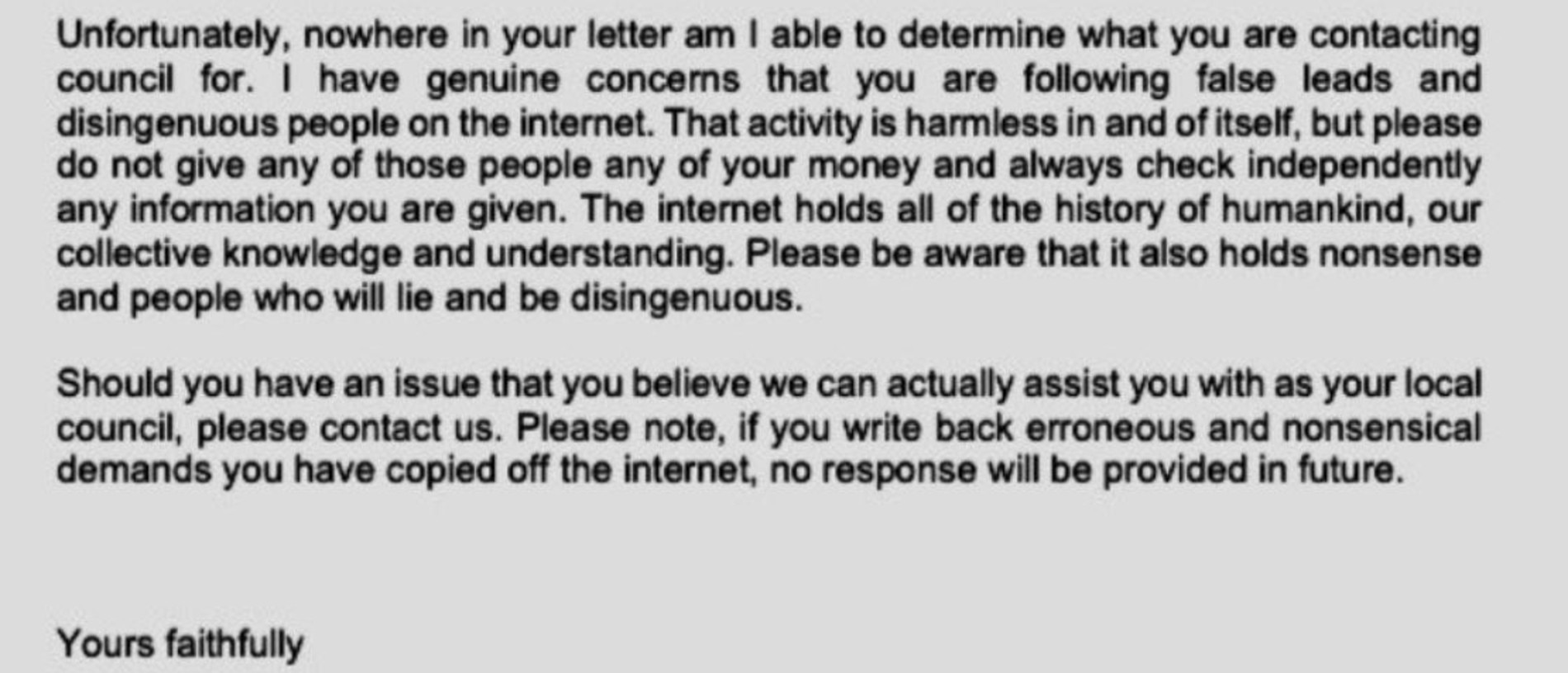
Law firm drops the hammer on sovereigns
South Australian law firm Kelledy Jones shared a blog post last year to reassure council staffers that “sovereigns” had no legal standing to refuse to pay their rates, fines and interest.
The firm said there were four main arguments sovereign citizens fell back on, which they explained were indicative of a “fundamental misunderstanding of the law.”
Those common grounds are:
1. The ratepayer has not entered into a contract with the council and has never agreed to sign any contract;
2. The Corporations Act 2001 and The Bills of Exchange Act 1909 apply;
3. The rates notice is not legally binding; and”
4. Rates are unlawful and illegal.
Kelledy Jones said they had seen a number of councils “inundated with baseless correspondence demanding that a response be provided”.
An unfortunate by-product of the influx of sovereign citizens, they said, was councils being forced to commence “debt recovery proceedings”, typically in the minor civil jurisdiction of the Magistrates’ Court.
They encouraged council officers to lean on some legal arguments if they found themselves being the court advocate for their council.
“The articulated reasons for not paying rates is without any legal basis. The imposition of council rates is lawful and legal, it accords with the legislative framework that provides the power, as set out in the Local Government Act 1999 (the Act),” they wrote.
“Rates are a tax. There is no ability to opt out of payment of a tax and it is an absurdity to suggest that it is a tax that is only payable on the basis of a pre-existing contract.”
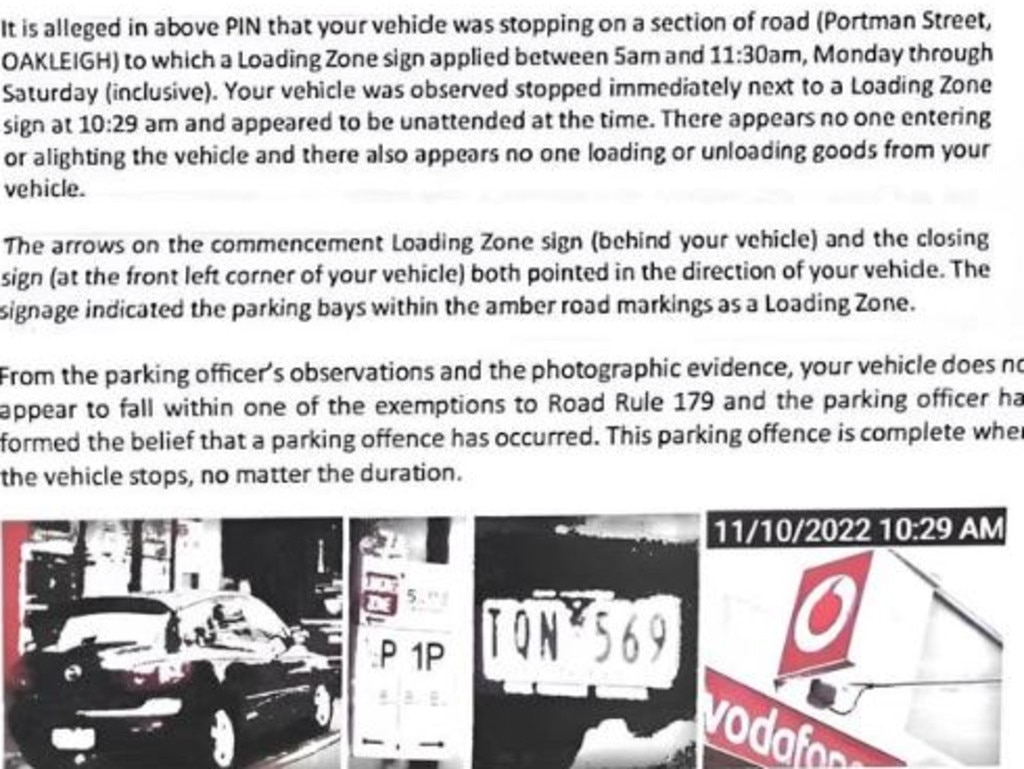
Déjà vu? Melbourne council takes on sovereign
It’s not the first time an Aussie council worker has torn a conspiracy theorist to shreds.
A City of Monash Council employee went viral last year after a copy of their letter to a sovereign citizen who tried to appeal their $110 parking fine was leaked online.
The driver, who was caught parking in a loading zone, brought the late Queen Elizabeth and the value of the Australian dollar in their baffling attempt to overturn the fine.
“I note that you are using a proforma letter from an internet site,” they wrote.
In perhaps the most sassy part of the letter, the worker wrote: “It also appears you are under the mistaken belief that Council is somehow legally obligated to provide you with ‘proof of claim’ within 28 days or you will consider Council to be bound by certain contractual obligations.
“As I indicated before, you appear to hold grave misconceptions of a variety of legal principles and in this case, I must state in the strongest possible terms, you cannot legally bind Council using such an ultimatum.”
City of Monash CEO Dr Andi Diamond congratulated their employee for their thorough response.
“Our officer took a factual, legal approach in his responses as he is required to do when assessing applications for review under the relevant legislation, and the letter reflects his attempt to answer all the questions and propositions that were put to him as part of the appeal to the infringement that was received,” she told news.com.au in a statement.
“The letter can be used as part of any future court proceeding that may arise if the infringement remains unpaid and accordingly the officer was comprehensive in his response.”
She acknowledged that people had found her staff member’s response “amusing” but added that this was not the intention of the letter, as they had just been doing their job.




